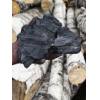Inexhaustible potential of charcoal

Charcoal possesses inexhaustible potential. At charcoal high heating up ability, small allocation of sulphur, a high parity of allocated heat to the allocated carbon, the low maintenance of inorganic impurity and the big surface of combustion. All it does it practically without a smoke. It is a rich source of carbon for the industry, for example, as adsorbent in blast furnaces.
In developing countries still there is a place for small manufacture of charcoal. They see charcoal as alternative of development of the internal resource. Despite the insufficient investment capital, in such countries very cheap labour. The future at charcoal is. Only it is necessary to use riches of resources rationally. And they have property to be settled.
In spite of the fact that charcoal substantially do less emissions of carbon, in the developed countries it neglect. At charcoal high heating up ability, small allocation of sulphur, a high parity of allocated heat to the allocated carbon, the low maintenance of inorganic impurity and the big surface of combustion. All it does it practically without a smoke. In the developed countries charcoal is used only for heating and cookery, but there are hundreds directions for potential use. It is a rich source of carbon for the industry, for example, as adsorbent in blast furnaces. It has been used to produce gas to power diesel and gasoline engines.
Charcoal can replace fossil fuel (coal, gas, oil, etc.) Traditional manufacture of charcoal is small and it actually one of the oldest human skills. The burning part of wood makes a heat, properly drying up and coking other part of wood in practically oxygen-free atmosphere.
The main problems were rather low manufacture of traditional methods (reception approximately tons of charcoal from approximately 4.5t dry wood), and pollution from an allocated smoke. And they can be improved industrial methods which at correct designing and management can make 1 ton of charcoal from 3,5 tons of wood. Furnaces for brick roasting are the most economic because they burn from a coking by-product - gas.
Small manufacture has a place.
' Correct ' the manufacture type is not always obvious, and the choice depends on balance between capital investment, a crop, transport expenses for wood and charcoal, number of the created workplaces and ability correctly to process by-products. In developing countries still there is a place for small manufacture of charcoal. Despite the insufficient investment capital, in such countries very cheap labour. In such countries investors where conditions allow, are used investments and local work for cultivation of a considerable quantity of wood.
Traditional methods of manufacture have advantages. They can use the most parts of green wood instead of well dried up, industrial systems necessary for the majority which can have big expenses for wood preparation. Whatever the method of production, the process must be sustainable and have minimum environmental impact. We cannot make the same mistake as with biofuels - cutting down virgin forest to produce it makes no sense.
Forestry naturally makes a large quantity of superfluous wood which can be carried to factory expenses. Considering the low maintenance of carbonaceous impurity, charcoal could be more useful fuel, than coal. As the soil conditioner, it can filter carbon, leaving it in soil in a current of hundreds years.
Creation of the future for charcoal
It sounds too well to be the truth - more effective, reliable and economic way for allocation of hydrogen from fossil fuel. But many companies advertise the zero issue based on charcoal of electricity as a way to the future - and put the big sums of money for experiments. Already, BP has been part of a large failed project in Aberdeen, Scotland, in the UK which was focused around the carbon capture and sequestion (which sees carbon sequested as carbon dioxide in deep geological formations). It is still working on a similar project in California with GE. Given the fact that the US has already placed funding of $1.2bn for a demonstration project for the world's first zero-emissions, coal-based electricity and hydrogen power plant, it is likely efforts here will come to fruition.
The USA has already financed 1,2 billion dollars in the project of demonstration of the first zero issue, and building of hydrogen power station based on charcoal. The pre-production model should become the first integrated coal gasification in the world. The hydrogen factory absorbing СО2 should become the purest factory of fossil fuel in the world. This project has headed Industrial union FutureGen.
Why charcoal?
Any copying and distributing the material of Ukrainian Biofuel Portal
without active hyperlink is stricly prohibited !
Link to this news: Inexhaustible potential of charcoal
Copy & Paste This Code to your website:
Views: 4366 Added: 15-03-2009
Average Rating:
Inexhaustible potential of charcoal









